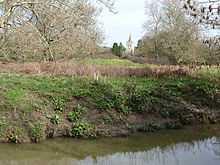George Shurley
Sir George Shurley (1569-1647) was an English-born judge who held the office of Lord Chief Justice of Ireland: uniquely among the holders of that office, he ranked as junior to Chief Justice of the Irish Common Pleas in precedence.[1]
Family and early life
He was born at Isfield, Sussex, the second son of Thomas Shurley and his first wife Anne Pelham of Laughton Place;[2] Sir John Shurley, the politician, was George's brother. Their great-grandfather, John Shurley, Cofferer to Henry VIII, had acquired Isfield in the 1520s. George's birthdate is sometimes given as 1559, but is likely to have been at least ten years later as John, who was the elder of the two, was probably born in 1568.[3]

He matriculated from Clare College, Cambridge in 1587, and was called to the Bar in 1597; he was a member of the Middle Temple and was made a Bencher in 1607.[4]
Judge
He was sent to Ireland as Lord Chief Justice in 1620, with a knighthood. He became Treasurer of the King's Inn, and a member of the Privy Council of Ireland. He sat in the Court of Castle Chamber (the Irish equivalent to Star Chamber); but he had a reputation for being "aloof" and for refusing to meddle in politics, and so he leaves little trace on the records of those bodies.[5]
He is known to have been outraged at being forced to yield precedence to Dominick Sarsfield, 1st Viscount Sarsfield, Chief Justice of the Common Pleas, which he termed "a discourtesy never before offered to one in my position".[6] Apart from the issue of precedence, he could reasonably have complained at any honour being shown to Sarsfield, a judge notorious for corruption, which led to his eventual removal from the Bench.[7] Shurley is also said to have complained of being forced to go on assize in Ulster, although he was happy to take the Munster circuit, and appears to have been diligent in the exercise of his duties.
In the disturbed period following the Irish Rebellion of 1641, he returned to England for a time and lived in Chester;[8] but he owned a substantial mansion, Young's Castle, in Dublin (of which no trace remains now), together with lands in County Carlow, and wished to spend his last years in Ireland. He returned to Ireland, and made a speech denouncing Confederate Ireland in 1644.[9] In 1646 he retired to Brightling in Sussex, where he died the next year. He was buried at St Margaret's Church, Isfield, with an impressive memorial.
Family
Shurley married Mary, daughter and heiress of Edward Halfhide of Aspenden, Hertfordshire.[10] They had at least four sons and two daughters: two of their sons, Robert and Arthur, in turn inherited Isfield from their uncle Sir John Shurley. One of their daughters, Judith, married Sir Samuel Crooke, 2nd Baronet, son of Sir Thomas Crooke, 1st Baronet; Sir Thomas was the founder of Baltimore, County Cork. The other Shurley daughter Penelope married Francis Selwyn.
Lady Shurley made her last will in April 1654, and probably died later the same year, as she refers in her will to her "serious illness". She owned property in both Ireland and Chester, the bulk of which she left to her daughter Penelope Selwyn. From the will it seems that of her other children Arthur, Judith, and another son, Thomas were still living in 1654.
Character
Elrington Ball states that Shurley was not a judge of outstanding ability, but that he was impartial and conscientious, and noted for his refusal to engage in political controversy.[11] He was also known to be a man of integrity, at a time when Irish judges were frequently accused of corruption.
References
- ↑ Ball, F. Elrington The Judges in Ireland 1221-1921 John Murray London 1926 Vol.1 p.328
- ↑ Ball p.328
- ↑ The inscription on George's memorial confirms the later date.
- ↑ Ball p.328
- ↑ Crawford, Jon G. A Star Chamber Court in Ireland- the Court of Castle Chamber 1571-1641 Four Courts Press Dublin 2005 p.105
- ↑ Crawford p.106
- ↑ Crawford p.106
- ↑ Ball p.329
- ↑ Ball p.329
- ↑ Ball p.329
- ↑ Ball p.251